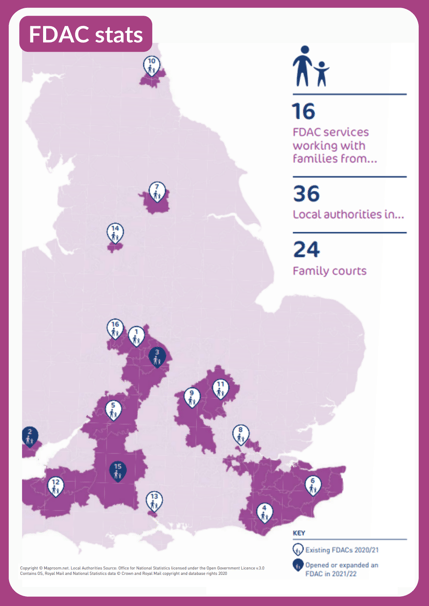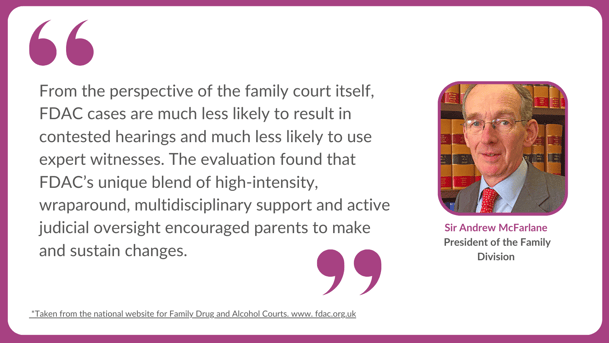In this month’s exclusive article family law blogger John Bolch examines the pros and cons of Family Drug and Alcohol Courts, how attitudes have changed and how FDACs seek better outcomes for children (and of course their families). Also questioned is the future of the scheme and the importance – and issues – of initiating a UK-wide network.
As any lawyer who has been involved in public law work can attest, parental drug and alcohol abuse are a regular unwelcome feature of child protection cases.
The effect of such abuse can obviously have a crippling impact upon the parents’ ability to provide proper care for their children, often leading to a downward spiral, at the end of which the children are provided with little or no effective care at all.
But there can be hope that things can be turned around.

Back in the dark ages when I began my career the attitude of the courts was often that parents who abused drugs or alcohol only had themselves to blame and were clearly unfit to look after their children.
Thankfully now the courts are generally much more enlightened, understanding that abuse is not necessarily a choice, and that with appropriate help many parents can pull themselves out of the quagmire.
And if, as is often the case, all of the serious problems facing the family stem from the abuse then maybe, just maybe, the law will not have to intervene to break the family apart.

Back in the 2000s a pioneering District Judge by the name of Nicholas Crichton saw how ‘problem solving courts’ worked in the USA, and thought that they could work equally well over here, in public law cases involving parental drug or alcohol abuse.
%20Graphic.png?width=656&height=369&name=Family%20Drug%20and%20Alcohol%20Courts%20(FDACs)%20Graphic.png)
As the name implies, a problem solving court is set up specifically to do just that.
Instead of simply proceeding to determine whether the situation of the family merits the intervention of the law, the courts (which became known as ‘Family Drug and Alcohol Courts’, or FDACs for short), collaborated with local agencies.
This approach was to try to help the parents escape the spiral of abuse, thereby improving the chances of the family staying together.

The first FDAC was established in London in 2008, and there are now 14 FDAC teams working in 24 family courts, covering 38 local authorities.
FDACs have been hugely successful, as we will see in a moment. But the FDAC concept has always suffered from lack of funding, meaning that many areas are not covered, and that two FDACs, in Kent and Somerset, have sadly had to close.


From the beginning the FDAC concept has had substantial support within the legal community, and one long-time supporter is the President of the Family Division himself, Sir Andrew McFarlane.
In a foreword to the recently published second annual report on the FDACs Sir Andrew pointed out that: “Although, in public law cases the court is working in the best interests of the child, all involved know that we are engaged in work which may lead to long-term adverse emotional and relational damage.
“We also know that, where we have to remove children from harm’s way and place them into care, their life chances are likely to be significantly worse than their peers.”
And this, he said, was why he is a supporter of FDACs, which work with the parents to try to solve the problems that have led the local authority to bring them to court.

Sir Andrew then referred to the important research into FDACs published in August by Foundations, the charity that seeks better outcomes for children, young people and their families by bringing the best available evidence to practitioners and other decision makers across the children’s social care sector.

The research, the first multi-site evaluation of FDACs conducted to date, clearly indicates the benefits that FDACs can bring. As Sir Andrew explained: “The statistically significant findings show that, compared to similar families going through standard care proceedings, FDAC families are much more likely to be reunified at the end of care proceedings, are much more likely to have ceased using substances, and their children much less likely to be placed in care.”

Unsurprisingly, Sir Andrew calls for the expansion of the FDAC scheme to cover the whole country. This will obviously require investment from government, but it is surely long past time that a system where the life chances of children depends upon a ‘postcode lottery’ of incomplete FDAC coverage be consigned to history.
 John Bolch
John Bolch